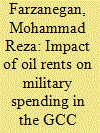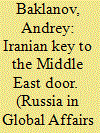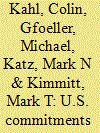|
|
|
Sort Order |
|
|
|
Items / Page
|
|
|
|
|
|
|
| Srl | Item |
| 1 |
ID:
163239


|
|
|
|
|
| Summary/Abstract |
This study shows how the level of corruption matters in the way oil rents affect a state's military spending. Using panel data covering the 1984–2014 period for the Gulf Cooperation Countries (GCC), we find that the effect of oil rents on military budgets depends on the extent of political corruption. Oil rents are negatively associated with military spending of the GCC countries. However this, in turn, is moderated by higher levels of corruption. For comparison, we examine this association in non-GCC countries in the MENA region, finding a positive effect of higher oil rents on military spending: this effect is larger in corrupt polities within non-GCC countries. The intermediary role of corruption in the military-oil nexus is robust, controlling for a set of variables that may affect military spending.
|
|
|
|
|
|
|
|
|
|
|
|
|
|
|
|
| 2 |
ID:
127051


|
|
|
|
|
| Publication |
2013.
|
| Summary/Abstract |
The election of Hassan Rouhani as Iran's president attracted everyone's attention with the inaugural ceremony attended by officials from more than 50 countries. The event gave rise to numerous propositions about a possible progress in the regime and in Tehran's future relations with the rest of the world. The prevailing perception is that the victory of a moderate and pragmatic candidate gives hope for a more fruitful dialogue which may facilitate the solution of numerous persisting problems. There is a good deal of reasoning in the propositions, yet deep-seated stereotype thinking still prevails. The assessments definitely need serious correction if we do not want to miss the opening opportunities - once again. In a situation of rigid Western economic sanctions and complicated relations with practically all of its neighbors, Iran nevertheless is turning into a most important state in a vast geopolitical area that embraces the Middle and Near East, Central and Western Asia. The Iranian aspect is present in practically all international problems that draw global attention, such as nuclear nonproliferation, the Middle East peace process, the legal status of the Caspian Sea, Central Asia, etc. Tehran is an active participant in the dialogue of civilizations and, naturally, remains one of the key players on the hydrocarbon market. To a large extent, Iran's role has been enhanced by the difficulties brought about by the Arab Spring in other major countries in the region, including Egypt - Iran's traditional competitor - which is sinking into the quagmire of internal political confrontation. Prior to the presidential election I happened to visit Iran and talk with some leading politicians and clerics about the situation in the country, their perception of the Iranian nuclear program and other issues that link Iran with other countries in the region and major world powers. Given the role played by the religious factor, it was particularly interesting to hear the opinions of religious leaders when visiting the holy Shi'ite city of Qom.
|
|
|
|
|
|
|
|
|
|
|
|
|
|
|
|
| 3 |
ID:
133620


|
|
|
|
|
| Publication |
2014.
|
| Summary/Abstract |
I will focus my remarks on Gulf anxieties as they relate to U.S. foreign policy in the Middle East, specifically as they relate to U.S. policy vis-à-vis Iran, which is very much a hot topic. There are some deep structural sources of anxiety that have created tensions in the relationship between the United States and our closest partners in the Gulf. There is a widespread perception in the Gulf region that the United States is simply politically exhausted with the Middle East as a whole and with the Gulf in particular, after more than a decade of war in Iraq and Afghanistan. I think they see the U.S. drawdown from Iraq and the imminent drawdown from Afghanistan, and they wonder when the United States will start to draw down its 35,000 soldiers, sailors, airmen, Marines and others who are every day on mission in the Gulf region.
|
|
|
|
|
|
|
|
|
|
|
|
|
|
|
|
|
|
|
|
|